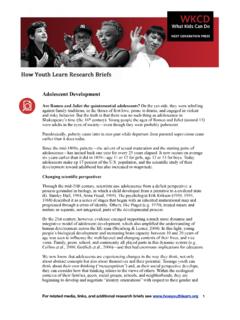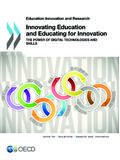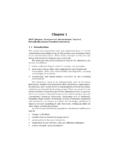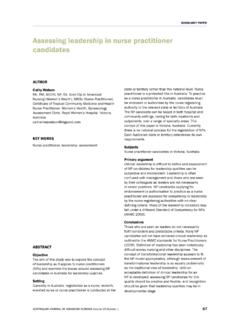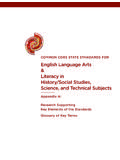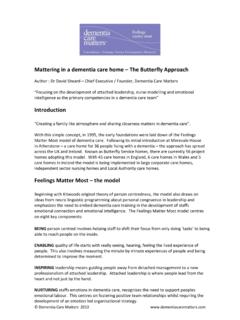Transcription of Paper prepared for the Gates Foundation by Carol S. Dweck ...
1 Academic Tenacity: Mindsets and skills that Promote Long-Term Learning Paper prepared for the Gates Foundation by Carol S. Dweck , Gregory M. Walton, & Geoffrey L. Cohen with the valuable assistance of David Paunesku and David Yeager. 2 Academic Tenacity: Mindsets and skills that Promote Long-Term Learning Introduction In a nationwide survey of high school dropouts (Bridgeland, DiIulio, & Morison, 2006), 69% said that school had not motivated or inspired them to work hard. Indeed, many of the students who remain in school are not motivated or inspired either, and the more time students spend in K-12 education the worse it gets (Eccles et al., 1998; Stipek, 2004). This represents a serious loss of human potential, with implications for students well-being later in life and for our country s future economic growth. What prevents students from working hard in school? Is it something about them or is it something about school? More important, is there a solution to this problem?
2 Most educational reforms focus on curriculum and pedagogy what material is taught and how it is taught. However, curriculum and pedagogy have often been defined in a narrow sense, with an almost exclusive focus on cognitive factors, that is, on the academic content of the material and students intellectual processing of that material. Research shows that this is insufficient. In our pursuit of educational reform, something essential has been missing: the psychology of the student. Psychological factors--often called motivational or non-cognitive factors -- can matter even more than cognitive factors for students academic performance. These may include students beliefs about themselves, their feelings about school, or their habits of self-control. Indeed, there is a growing recognition in education, psychology, and economics of the importance of non-cognitive factors in achievement both in school and in the labor market 3 (Duckworth & Seligman, 2005; Dweck , 1999; Heckman, Stixrud, & Urzua, 2006; Steele, Spencer, & Aronson, 2002).
3 There has also been a recognition that these factors offer promising levers for raising the achievement of underprivileged children and, ultimately, closing achievement gaps based on race and income (Heckman et al., 2006). The research we review in this Paper shows that educational interventions and initiatives that target these psychological factors can have transformative effects on students experience and achievement in school, improving core academic outcomes such as GPA and test scores months and even years later. When we refer to the psychology of the student, what do we mean? We mean that students need to think of themselves and school in certain ways in order to want to learn and in order to learn successfully. We also mean that they are able to regulate themselves in ways that promote learning. When these non-cognitive factors are in place, students will look (and will be) motivated. In fact, these non-cognitive factors often constitute the greater part of what psychological researchers call motivation, and fostering these mindsets and self-regulation strategies is what psychological researchers typically mean by motivating students.
4 This is quite different from common lay conceptions of motivation in which adults try to motivate students through money and other rewards. The kind of motivation we emphasize is motivation that students carry with them in the form of mindsets and skills , and the kind that educators promote by fostering these mindsets and skills . Haven t there been attempts in the past to motivate students by promoting positive beliefs? Didn t the self-esteem movement of the 1990s try to motivate students by making them feel good about themselves, their abilities, and their prospects of success in school? Yes, but unfortunately for the thousands of students concerned, the self-esteem movement had an 4 erroneous conception of how to foster motivation. The view was that telling students they were smart or talented would raise their self-esteem and motivate them to do well in school (Baumeister, Campbell, Krueger, & Vohs, 2005). In fact, research has now shown that intuitive and well-intended practices, such as praising students intelligence or talent (as opposed to their efforts or strategies), often backfire (a topic discussed later).
5 This is why research is so important and why an evidence-based approach to education is so critical at this time. We need to know which mindsets and non-cognitive skills matter and how best to impart them in educational settings. Can focusing on students psychology possibly be effective when students come from poor backgrounds, live in communities with many problems and few resources, and go to underfunded, understaffed, and underachieving schools? Shouldn t we put all our resources into enriching homes, communities, and schools? It is undoubtedly important to provide students with the material and human resources, such as a safe learning environment, committed teachers, and a solid curriculum--resources that make their life circumstances more conducive to high achievement and more equitable. However, addressing the psychology of the student is also critical. And, as we will see, this can galvanize students to seize the opportunities for learning that are present in their school environment.
6 This is because adversities that children experience both in school and outside of it can have effects on their psychology, with consequences for learning. It is these non-cognitive factors that psychological researchers have learned to alter for the better. Therefore, while we attempt to tackle large-scale structural problems, we can directly help students to become more motivated and successful learners. Moreover, with greater awareness of non-cognitive factors, 5 educators may be able to do relatively small things in classrooms that can make a big difference in their students learning. Defining Academic Tenacity The non-cognitive factors that promote long-term learning and achievement can be brought together under the label academic tenacity. At its most basic level, academic tenacity is about working hard (and working smart) for a long time. More specifically, academic tenacity is about the mindsets and skills that allow students: o to look beyond short-term concerns to longer-term or higher-order goals, and o to withstand challenges and setbacks to persevere toward these goals.
7 Short-term concerns might involve worries about looking dumb or being excluded in school. They might involve an unwillingness (or inability) to subordinate immediate gratification to longer-term achievements. Any of these factors may make students less engaged with school, less likely to take advantage of opportunities to learn, and less equipped to meet challenges or setbacks. What do academically tenacious students look like? First, they believe that they belong in school academically and socially. School is part of who they are and is seen as a route to future goals, such as providing for their families or contributing to their community or society. Second, they are engaged in learning, view effort positively, and can forego immediate pleasures for the sake of schoolwork. For example, they seek challenging tasks that will help them learn new things, rather than tasks in their comfort zone that require little effort but provide little opportunity to learn.
8 Third, difficulty, be it intellectual or social, does not derail them. They see a setback as an opportunity for learning or a problem to be solved rather than 6 as a humiliation, a condemnation of their ability or worth, a symbol of future failures, or a confirmation that they do not belong. This is true at the level of a given task and at the level of their studies in general. Tenacious students know how to remain engaged over the long haul and how to deploy new strategies for moving forward effectively. As will be seen, students may bring these mindsets and skills with them to school, and we will review research showing that measures of students mindsets and skills predict their future school performance. These mindsets and skills can also be taught, and we will review interventions that change students achievement by changing specific mindsets and skills . At the same time, many schools may, advertently or inadvertently, foster certain mindsets or skills , and we will show that the programs and schools that succeed in raising achievement often do so by promoting the very mindsets and skills that contribute to academic tenacity.
9 We focus on research with adolescents, and particularly with low-income and minority adolescents, but we draw on research featuring other groups, because many of the causes and consequences of academic tenacity apply to all students regardless of their age, ethnicity, gender, or income level. Measuring Tenacity and Its Effects on Achievement Although differences in intellectual ability predict differences in students academic performance, wide variation exists in academic success among students with the same level of ability. Why do some students perform better than others even when they have the same level of ability or past performance? Three decades of psychological research have shown how two students, each with high academic ability, can have markedly different responses to frustration, with one relishing the opportunity to learn 7 and the other becoming demoralized and giving up (Bandura, 1997; Diener & Dweck 1978). Such responses, in turn, affect students ability to learn over the long term.
10 Research shows that non-cognitive variables are critical for sustained levels of academic success. More specifically, these variables include students beliefs about themselves, their goals in school, their feelings of social belonging, and their self-regulatory skills . All contribute to tenacity and academic performance. In this section, we review measures of these variables, highlighting their relevance to academic tenacity and their ability to predict students future performance above and beyond their history of achievement. In the next section, we describe interventions designed to affect these sources of tenacity and we examine their effects on academic achievement. As will be seen, although students who are lowest performing or most at risk in school are thought to be the hardest to reach, it is often the lowest achievers who respond most to these psychological interventions. This is because in many cases these non-cognitive factors were holding them back.
